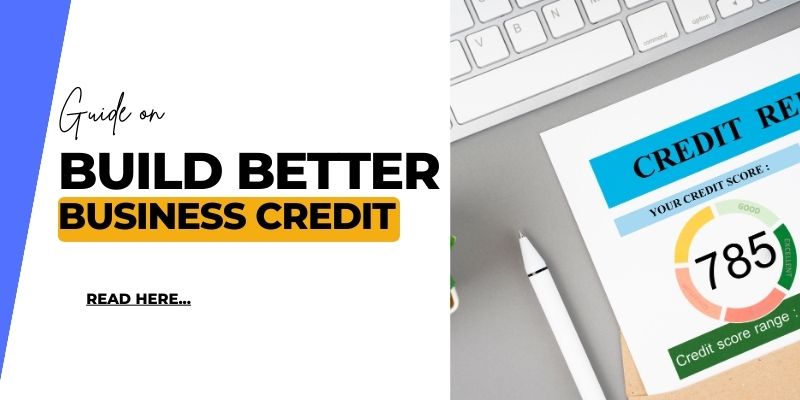The Ultimate Guide to Building Business Credit and Getting Funded Faster
A Complete Guide on Building Business Credit That Empowers Your Business.
📌 Summary
Building business credit separates personal and business finances for better funding access.
Start by forming an LLC, getting an EIN, and opening a business bank account.
Open Net‑30 vendor accounts and register with bureaus like Dun & Bradstreet.
Pay early, keep credit utilization low, and track progress consistently.
Good business credit unlocks loans and vendor terms—often without a personal guarantee.
Editorial Note: This page may feature products or services from our partners, and we may earn a commission if you take action through the links provided. Our recommendations are based on independent research, and compensation does not influence our evaluations or opinions.

How Can You Build Strong Business Credit Quickly?
Building strong business credit is essential for securing funding, getting better vendor terms, and ensuring financial stability. Many entrepreneurs, especially those with a new business, struggle with understanding how to establish and grow their business credit file. In this comprehensive guide, we’ll explore how to build business credit with an EIN, how to build business credit without a personal guarantee, and how to do it fast. If you’re looking for actionable insight to establish business credit quickly, this article will provide exactly that.
Why Is Building Business Credit Important for Small Businesses?
Business credit is separate from personal credit and plays a crucial role in securing financing, negotiating better terms with suppliers, and establishing credibility with lenders. When you build a strong business credit file, your company can access:
- Higher credit limits
- Lower interest rates
- Increased borrowing power
- Separation of business and personal finances
How Do You Establish Business Credit for the First Time?
To establish business credit for the first time, you need to properly set up your business as a legal entity—such as an LLC or corporation—separate from your personal finances. Start by obtaining an EIN (Employer Identification Number) from the IRS, opening a business bank account, and registering with business credit bureaus like Dun & Bradstreet, Experian Business, and Equifax Business. Then, open vendor accounts that report to these bureaus and pay all bills on time. Over time, this consistent activity helps you build a strong business credit profile that can unlock better financing options, higher credit limits, and improved vendor terms.
How Does Business Credit Work and What Steps Can You Take to Build It?
Just like your personal credit score, business credit is tracked and reported by credit bureaus such as Dun & Bradstreet, Experian Business, and Equifax Business. These agencies collect data from vendors, banks, and lenders to assess a company’s financial responsibility.
Your business credit score is influenced by:
- Payment History: On-time payments boost your credit score, while late or missed payments can significantly lower it.
- Credit Utilization: Using a high percentage of your available credit can negatively affect your business credit score.
- Business Age: Older businesses with a longer credit history tend to score higher due to proven financial responsibility over time.
- Credit Mix: A diverse credit portfolio—including trade lines, credit cards, and business loans—helps demonstrate your ability to manage different types of credit.
Step 1: Establish Your Business Properly
The first step in building business credit is setting up your company in a legitimate and credible way. This includes forming a legal entity and separating your business finances from your personal ones. These steps build the foundation of your credit profile and are necessary before you can apply for credit or loans. Lenders and bureaus want to see that you are operating professionally and consistently.:
- Incorporate Your Business – Choose an LLC, S-Corp, or C-Corp structure to separate personal and business liabilities.
- Obtain an EIN (Employer Identification Number) – An EIN is necessary for tax purposes and business credit applications. How to Get an Employer Identification Number (EIN)
- Open a Business Bank Account – Keeping business finances separate from personal funds is crucial for building business credit.
- Get a Business Phone Number and Address – A dedicated business line and address (not a P.O. Box) increase your credibility with lenders.
Step 2: Register with Business Credit Bureaus
Once your business is properly structured, you must register with the major business credit bureaus. These bureaus track your company’s credit activity and assign a credit score based on your behavior. Ensuring your information is accurate and complete helps you build credibility and avoid discrepancies that may harm your score later. To establish a business credit file, register your business with major business credit bureaus:
- Dun & Bradstreet (D&B): Get a D-U-N-S number for free and start building your credit profile.
- Experian Business: Check if your business is listed and start monitoring your credit.
- Equifax Business: Ensure your business data is accurate and up-to-date.
Step 3: Establish Trade Credit with Vendors
Trade credit is one of the easiest and fastest ways to start building business credit. When you work with vendors who report payments to the credit bureaus, you begin to establish a history of financial reliability. Even small purchases made on Net-30 terms can go a long way if paid on time. Consistency and early payments are key here.
- Net-30 Accounts: To start building credit, work with vendors that report payments to business credit bureaus. These vendors may offer Net-30 or Net-60 payment terms, meaning you receive goods or services upfront and pay within 30–60 days. Consistently paying vendors on time improves your credit score.
Check Here How Much Fund You Can Get. - Starter Vendors: Companies like Uline, Quill, and Grainger provide credit to new businesses
- Timely Payments: Always pay invoices before the due date to maintain a strong credit file.
Step 4: Open a Business Credit Card
Getting a business credit card helps you manage expenses and continue building your credit. It also adds to your credit mix, which is a factor in your score. Make sure the card reports to commercial bureaus and be disciplined with usage to avoid overspending or carrying high balances. A business credit card is a powerful tool for growing your business credit. Choose a card that:
- Reports to major business credit bureaus
- Has no personal guarantee requirement (if possible)
- Offers rewards and benefits suited for your business
Step 5: Apply for Business Loans or Lines of Credit
As your business builds credit history and revenue, you’ll qualify for more significant funding options. Loans and lines of credit give you access to capital for growth and signal to credit bureaus that lenders trust you. Choose the right type of funding based on your goals and always manage repayment responsibly.Once your business credit file is established, you can apply for:
- Business Lines of Credit – Provides flexible funding for operational expenses. More about business line of credit
- Business Term Loans – Best for large investments like equipment or expansion.
- SBA Loans – Backed by the government, these loans offer low-interest rates for qualified businesses.

Can You Build Business Credit Without a Personal Guarantee?
Separating personal and business credit protects your personal finances and improves your business’s independence. To qualify for credit without a personal guarantee, your business needs a strong credit profile and reliable income. Start with vendor accounts, then progress to non-PG credit cards or funding. Many entrepreneurs want to separate business credit from personal finances. To achieve this:
- Strengthen Business Credit First – Lenders require a strong credit history before approving credit without a personal guarantee.
- Apply for Vendor Credit First – Start with vendors that don’t require a personal guarantee. Unsecured business Finance on of them.
- Build Revenue and Financial Stability – Lenders prefer companies with stable revenue streams and strong financials.
- Seek Non-Personal Guarantee Business Credit Cards – Some banks offer these for well-established businesses.
What’s the Fastest Way to Build Business Credit?
If you’re eager to accelerate your credit-building journey, the right actions taken early on can shorten the process significantly. Focus on high-impact steps like opening multiple reporting trade lines, making early payments, and keeping utilization low. Discipline and focus are key.For those looking to speed up the process, follow these tips:
- Establish Trade Credit Immediately – Work with multiple vendors that report to credit bureaus.
- Keep Credit Utilization Low – Maintain a credit utilization ratio below 30%.
- Pay Early and Often – Making early payments boosts your business credit score quickly.
- Monitor Your Credit Regularly – Use services like Nav or Experian Business to track progress.
- Avoid Applying for Too Much Credit at Once – Multiple inquiries in a short period can lower your score.
What’s the Best Way to Start Building Business Credit for Funding potential
Building business credit is one of the most effective ways to increase your company’s funding potential. A strong credit profile makes your business more attractive to lenders, vendors, and financial institutions. Start by properly structuring your business, obtaining an EIN, and opening a separate business bank account. Register with major credit bureaus and establish trade credit accounts with vendors that report payments. Paying on time, keeping credit utilization low, and monitoring your credit file consistently will help improve your score. As your credit strengthens, your eligibility for higher funding limits and more favorable loan terms improves—giving your business room to grow.
Monitor and Maintain Your Business Credit
Once you’ve built a business credit file, it’s important to maintain it actively. Regular monitoring helps you catch inaccuracies, ensure good standing, and stay prepared for financing opportunities. Good credit is built through ongoing diligence, not a one-time effort.
Why Monitoring Matters
Business credit reports can change frequently as new trade lines, payment data, or public records are reported. Monitoring helps you:
- Detect errors or discrepancies that could lower your score
- Identify signs of identity theft or unauthorized activity
- Track the impact of your financial habits on your credit health
Tools to Monitor Your Credit
Several agencies offer tools to access and track your business credit data. Consider using services from D-U-N-S Number from Dun & Bradstreet, Experian Business, or Equifax Business. These platforms can notify you of changes, provide detailed analytics, and offer suggestions for improvement.
Maintenance Best Practices
- Pay invoices and debts on time—or early—to establish a strong payment history
- Limit credit utilization to avoid appearing overleveraged
- Keep business and personal finances clearly separated
- Update business information regularly with data providers and credit bureaus
Monitor and Maintain Your Business Credit
- Pay invoices and debts on time—or early—to establish a strong payment history
- Limit credit utilization to avoid appearing overleveraged
- Keep business and personal finances clearly separated
- Update business information regularly with data providers and credit bureaus
Frequently Asked Questions
How do I build business credit for the first time?
Start by forming a legal business entity such as an LLC or corporation. Apply for an EIN, open a business bank account, register with business credit bureaus like Dun & Bradstreet, and establish Net-30 vendor accounts that report to those bureaus. Always pay bills on time.
How long does it take to build business credit?
It generally takes 3 to 6 months to begin seeing credit activity. However, building a strong credit profile that lenders trust can take 12 months or more, depending on how consistently you use and repay business credit accounts.
Can I build business credit without using my personal credit?
Yes, many vendors and lenders offer credit products that do not require a personal guarantee. However, when starting out, some providers may still check personal credit. Over time, you can separate personal and business credit entirely.
Do I need an EIN to build business credit?
Yes. An EIN (Employer Identification Number) is essential for identifying your business when applying for credit, opening a business bank account, and registering with credit reporting agencies.
What vendors report to business credit bureaus?
Popular vendors that report include Uline, Quill, Grainger, and Summa Office Supplies. These companies offer Net-30 terms and help you build business credit history when payments are made on time.
What are Net-30 accounts and why are they important?
Net-30 accounts let you buy now and pay within 30 days. When these accounts report to business credit bureaus, they help build your credit file by showing positive payment history, which is vital for your credit profile.
How can I monitor my business credit score?
You can monitor business credit using services like Nav, Dun & Bradstreet CreditSignal, Experian Business Credit Advantage, and Equifax Business. Regular monitoring helps track changes and spot errors quickly.
Does my business credit impact loan approval?
Yes. Lenders often check your business credit report to determine loan eligibility, interest rates, and credit limits. A strong credit score can increase your chances of approval and better financial terms.
Final Thoughts
Understanding how to build business credit is essential for long-term financial success. Whether you’re a new business owner or looking to improve your credit file, following these steps will help establish and grow your credit profile. By learning how to build business credit with an EIN, applying for vendor accounts, and maintaining responsible financial habits, you can quickly position your business for better financial opportunities.
By leveraging these strategies, you’ll not only build business credit fast but also ensure your company’s long-term financial stability and success.







